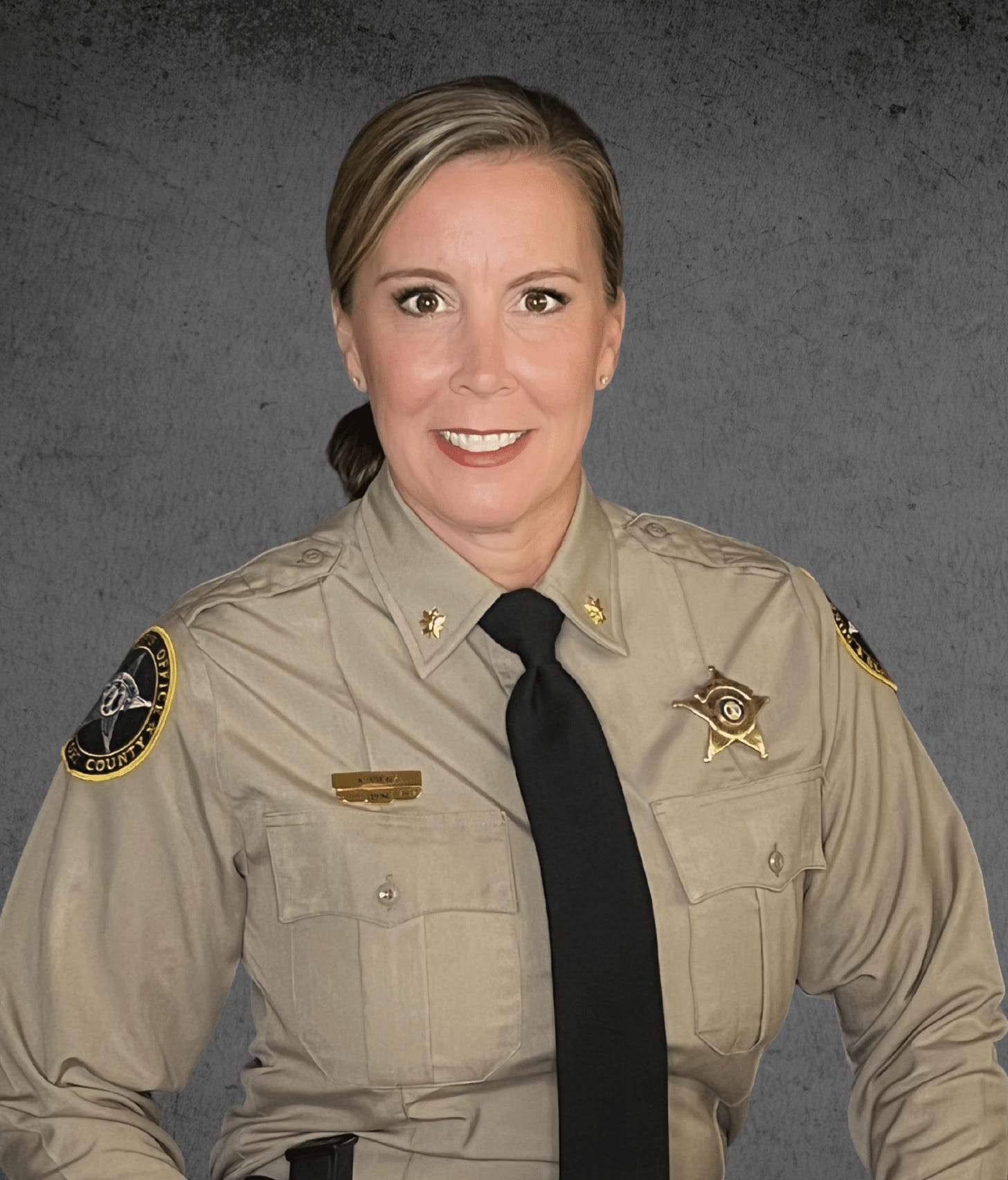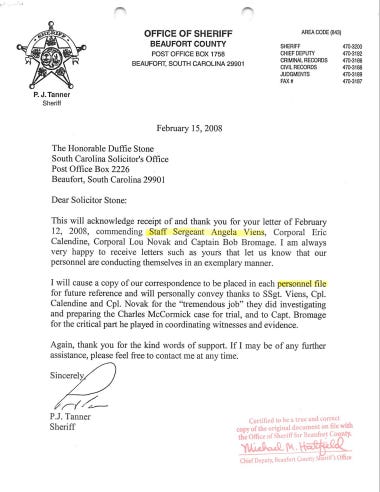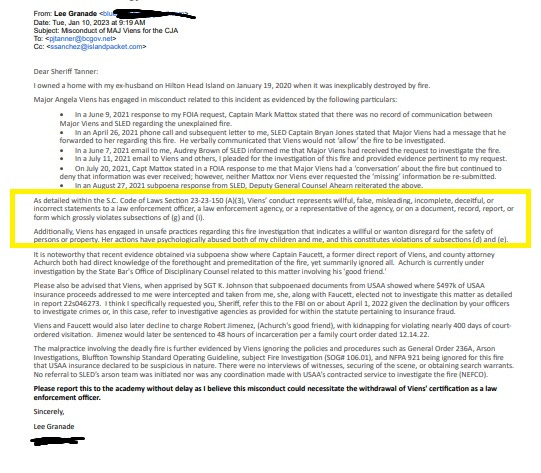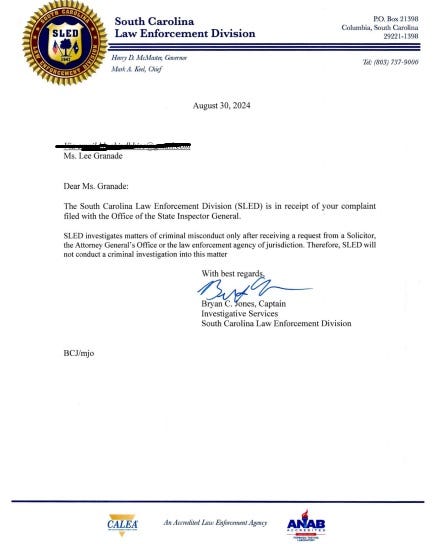Does Sheriff Tanner Reward Bad Performance? Spotlight on (retired) Major Angela Viens and her $126k salary.
Because Tanner enjoys little, if any, oversight from a "do nothing" AG, who can ensure this Beaufort sheriff maintains the standards expected of an S.C. officer?
Being promoted for longevity makes sense, particularly when an employee is doing a good job... but what if they're not great? Such appears to have been the case with the recently retired Beaufort County Sheriff Office (BCSO) Public Information Officer (PIO) Angela Viens, under the leadership of Sheriff PJ Tanner.
Before her retirement in the spring of 2024, Viens enjoyed a profitable and comfortable position with BCSO. Having started with BCSO in 1996, Viens went from making less than $20,000 to a whopping $126,597 ($60.86/hour) in 2023. For reference, Viens’ predecessor, former Major Bob Bromage earned a salary of $105,277 in 2021, and the average sheriff salary in S.C. is approximately $123,896 (Source: govsalaries.com).
A comprehensive review of 154 pages of Viens’ personnel file showed where Sheriff Tanner went to great lengths to commend, laud, and copiously document her good behavior. Tanner would often write letters of appreciation to others who complimented Viens when she did a ‘good job.’ In one such example, Tanner thanked the solicitor for complimenting Viens with a copy to her file.
Viens’ performance seemed to usually be acceptable, except when it was not. She was given a written reprimand for failing to contact victims in cases assigned to her. On another occasion, she was found to be at fault in causing a car accident in a county owned vehicle for which she paid restitution, yet it was only 10% of the lowest cost estimate. The most significant blemish in Viens’ performance appears to have been the result of a comprehensive investigation in 2014. As shown below, Viens received counseling and was placed on probation status for a full year after violating department policies and procedures.

Shortly after her probation ended, Viens’ salary continued to climb. An August 2015 pay increase took her to $77,454 annually which would further balloon by an amazing 63% in the subsequent 8 years to her final salary of over $126k.
Since a tainted work history did not give Sheriff Tanner reason for pause in promoting Viens, she was awarded a position with significant oversight and responsibilities commanding the Southern Patrol Division. It was during Viens’ tenure in that role that this writer had personal experience with her failure to investigate criminal activity with apparent falsification of documents related to the same.As has been well documented by FitsNews and others, the tendency for law enforcement agencies to be noncompliant with statutory guidance can leave South Carolinians wondering who will enforce the law in an honest, transparent, and well-intentioned manner.
In this matter, although Viens’ misconduct was directly reported to Tanner, there was no record of such in her personnel file received via FOIA. Even more concerning was that there was no evidence that Tanner had reported her misconduct as he is required to do by statute.
Though it is not surprising that the sheriff ignored a complaint, the Criminal Justice Academy (CJA) governed by the South Carolina Training Council does not give discretion in reporting misconduct. As the governing body setting standards for those employed in law enforcement and criminal justice across the state, the CJA requires that “certification misconduct,” must be reported to the agency. Defined as the 9 Deadly Sins below, a finding of any of the following is expected to result in officer losing his or her badge:
It certainly appeared that Viens’ actions placed her at risk of having her “cert pulled,” resulting in the loss of her badge; instead, Sheriff Tanner shirked his responsibility to report to the CJA - even when prompted by this writer - in apparent violation of S.C. state law.
The CJA also claimed they had no authority to act on Viens’ delinquency until the sheriff chose to report the misconduct. When asked if the CJA would penalize Sheriff Tanner when he failed to report malfeasance by an officer in accordance with SC Code § 23-23-150 (2018), there was no appetite for enforcing this law either:
The sheriff or the chief executive officer of a law enforcement agency or department within the State must report to the academy the occurrence of any act or multiple acts of misconduct by a law enforcement officer which could result in the withdrawal of the certification of the law enforcement officer who is currently or was last employed by his agency. The report shall be made within fifteen days of the final agency or department action resulting from the internal investigation conducted by the agency or department, and shall be on a form prescribed by the council. A willful failure to report information related to acts of misconduct shall subject the violator to a civil penalty as provided by the council.
Viens ultimately retired from BCSO in 2024 where, as PIO, truthfulness and integrity would have been paramount to provide Beaufort County residents with accurate and honest accounts of law enforcement activity.
Viens is Likely Not the Only One…
This Substack has also tried to amplify the need for scrutiny in Mark Roseneau's position at BCSO under Tanner’s direction. Having been alerted that the long-term Beaufort County Director of Facilities Maintenance was, along with his fishy fish camp that did not exist on paper, now receiving special treatment from the sheriff, this author advised the Office of the Investigator General (OIG) of concerns via their confidential reporting system.
The OIG, lacking jurisdiction to investigate Tanner, referred the matter to the S.C. Law Enforcement Division (SLED) who subsequently disclosed the reporter’s identity and concerns to the sheriff. SLED’s refusal to keep an OIG report confidential resulted in Tanner’s calling the reporter, claiming I was engaging in “criminal slander” for researching his friend.
After SLED did not comply with the OIG’s direction to keep me abreast of the potential investigation of Tanner, I asked them directly for an update (approximately a dozen times). After 3 months, I received the following correspondence which stated they are not investigating what this author reported to the OIG.
If wondering how law enforcement can go rogue in S.C., in this writer’s personal experience, there is no oversight, accountability, or checks and balances. Specifically,
The CJA is not holding the sheriff accountable,
SLED does not follow direction of the OIG,
The CJA only gives credence to sheriff or SLED reports of misconduct,
The sheriff may promote substandard officers to roles of tremendous responsibility with incredibly generous pay for any reason,
SLED may not reliably maintain the confidentiality of an informant,
The sheriff may not report officer misconduct in accordance with state law, and
The “do nothing” AG has historically not been receptive to receiving reports of wrongdoing.
These dynamics, coupled with the desire and propensity to “self-police” internally, can make the quest for justice and accountability much more difficult than it has to be for South Carolina victims.












